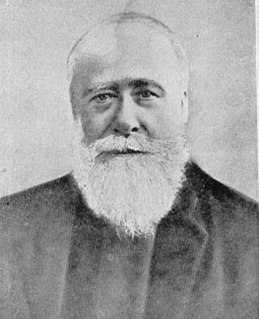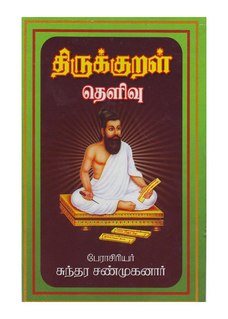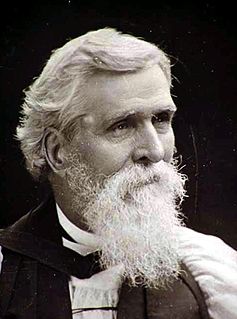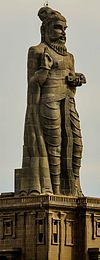
George Uglow Pope or G.U. Pope was an Anglican Christian missionary and Tamil scholar who spent 40 years in Tamil Nadu and translated many Tamil texts into English. His popular translations included those of the Tirukkural and Tiruvachagam. He later took to teaching, running his own school in Ootacamund for while and then moving to head the Bishop Cotton Boys' School in Bangalore and after returning to England worked as a Lecturer at Balliol College, Oxford. A statue on the Chennai beach recognizes him for his contribution to the understanding and promotion of the Tamil language.

Parimelalhagar, also known as Vanthuvarai Perumal, was a Tamil poet and scholar known for his commentary on the Thirukkural. He was the last among the canon of ten medieval commentators of the Kural text most highly esteemed by scholars. He was also among the five oldest commentators whose works had been preserved and made available to the Modern era, the others being Manakkudavar, Pari Perumal, Kaalingar, and Paridhi. Although the chapter ordering, and the verse ordering within each chapter, of the Tirukkural as set by Parimelalhagar varies greatly from the original work of Valluvar, the scholars and publishers of the modern era primarily follow Parimelalhagar’s ordering. Thus, it is Parimelalhagar’s ordering that is used to number the Kural chapters and couplets today.

The Tirukkural, or shortly the Kural, is a classic Tamil text consisting of 1,330 couplets or Kurals, dealing with the everyday virtues of an individual. It is one of the two oldest works now extant in Tamil literature in their entirety, the other being the Tolkappiyam. Considered one of the greatest works ever written on ethics and morality, chiefly secular ethics, it is known for its universality and non-denominational nature. It was authored by Valluvar, also known in full as Thiruvalluvar. The text has been dated variously from 300 BCE to 5th century CE. The traditional accounts describe it as the last work of the third Sangam, but linguistic analysis suggests a later date of 450 to 500 CE.
John Lazarus (1845–1925) was a Christian missionary to India who rendered the Tirukkural into English. He revised the work of his predecessor William Henry Drew, who had already translated the first 63 chapters of the Tirukkural, and translated the remaining portion of the Kural text.
As of 2015, Latin is the first foreign language into which the Tirukkural was translated. There are three known translations of the Kural text available in Latin.
Kannada has at least eight translations of the Tirukkural available as of 2014. Both prose and verse translations have been made in Kannada.
K. M. Balasubramaniam was a Tamil writer and supporter of the Dravidian Movement, and a translator of the Tirukkural into English. He came to be known as Thiruvachakamani for his translation of Manikkavacakar’s Thiruvasagam into English before translating the Kural text.
Edward Jewitt Robinson was a Protestant missionary to British India. He is best known as one of the earliest translators of the Tirukkural into English.

Among the European languages, German has the third highest number of translations of the Tirukkural, after English and French. As of 2015, there were at least eight translations of the Kural text available in German.
Malayalam has seen the most number of Tirukkural translations than that of any other language in India. As of 2007, there are at least 21 translations of the Kural text available in Malayalam. Malayalam also has the distinction of producing the first ever translation of the Kural text among the languages in India and the world at large. The Annual Report of the Cochin Archeological Department for the year 1933–34 reported an unpublished manuscript of a Malayalam translation of the Tirukkural made in 1595.
By 2000, there were at least five translations of the Tirukkural in Odia, all published after the 1970s.
Herbert Arthur Popley was a Christian missionary of London Mission, Erode, known for his literary work as a translator of the Tirukkural and his skill in rendering Tamil Christian music in the Carnatic style. He was secretary of the All-India Y.M.C.A. At the time of his death, he was president of the local Y.M.C.A. and a director of the Coonoor Co-operative Urban Bank Ltd. He died in Coonoor on 9 May 1960 at the age of 81.
Manakkudavar was a Tamil poet and commentator known for his commentary on the Thirukkural. His is the earliest of the available commentaries on the ancient work, and hence considered to bear closest semblance with the original work by Valluvar. He was among the canon of ten medieval commentators of the Kural text most highly esteemed by scholars. He was also among the five ancient commentators whose works had been preserved and made available to the Modern era, the others being Pari Perumal, Kaalingar, Paridhi, and Parimelalhagar.
Pari Perumal, also known as Kaviperumal, was a Tamil poet and commentator known for his commentary on the Thirukkural. He was among the canon of ten medieval commentators of the Kural text most highly esteemed by scholars. He was also among the five ancient commentators whose works had been preserved and made available to the Modern era, the others being Manakkudavar, Kaalingar, Paridhi, and Parimelalhagar.
Tiruvallam Bhaskaran Nair is a 20th-century Malayalam poet known for his Malayalam translation of the ancient Indian philosophical text of Tirukkural, among other Tamil, Sanskrit and English works. Nair translated only the first of the three books of the Kural text, and the translation was made in prose. The Sankaracharya of Kanchi has felicitated him as 'Kavyavallabhan'.
Soibam Rebika Devi is an Indian translator who is best known for translating the Tirukkural into Meitei.
The Book of Inbam, in full Iṉbattuppāl, or in a more sanskritized term Kāmattuppāl, also known as the Book of Love, the Third Book or Book Three in translated versions, is the third of the three books or parts of the Kural literature, authored by the ancient Indian philosopher Valluvar. Written in High Tamil distich form, it has 25 chapters each containing 10 kurals or couplets, making a total of 250 couplets all dealing with human love. The term inbam or kamam, which means 'pleasure', correlates with the third of the four ancient Indian values of dharma, artha, kama and moksha. However, unlike Kamasutra, which deals with different methods of lovemaking, the Book of Inbam expounds the virtues and emotions involved in conjugal love between a man and a woman, or virtues of an individual within the walls of intimacy, keeping aṟam or dharma as the base.
The dating of the Tirukkural, and by extension the period of its author Valluvar, has been a subject of intense debate among scholars for centuries, and it continues to remain so. The Tamil Nadu government has ratified 31 BCE as the year of birth of Valluvar. Still the precise date as to when Valluvar completed writing the Kural text remains murky. This article speaks about various dates arrived at by various scholars over time.











